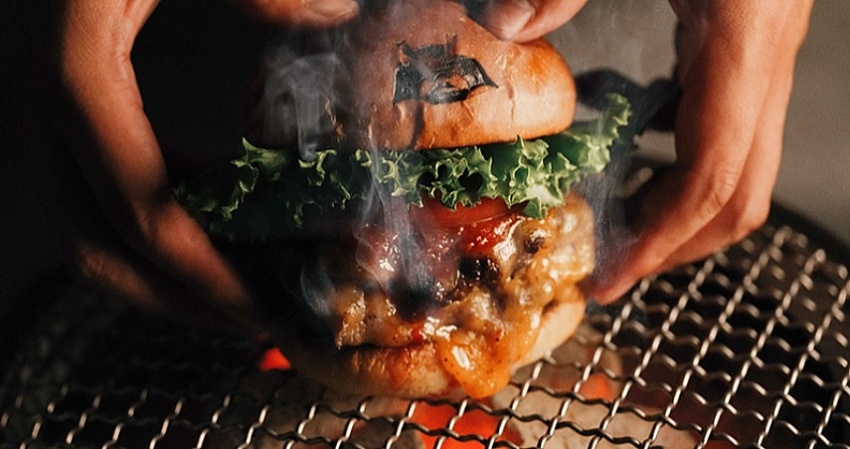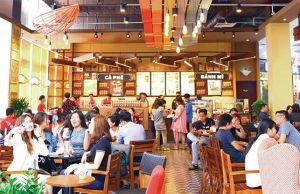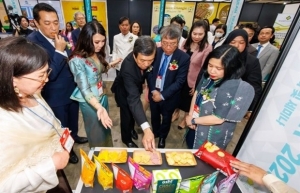Mixed fortunes persist in F&B arena
Japanese burger establishment, Shogun Burger, marked its global footprint with the inauguration of its premier outlet in Vietnam last month.
 |
| Japanese burger establishment, Shogun Burger - photo: shogun-burger.com |
Strategically positioned within Ho Chi Minh City’s vibrant Binh Thanh district, the establishment seeks to captivate the local Japanese community and the burgeoning tourist demographic.
Beyond the introduction of its hallmark burger offerings, Nikkei Asia reported that Shogun Burger will venture into curating an assortment of bespoke creations meticulously tailored to Vietnamese palates.
This culinary endeavour will encompass an innovative melding of premium Japanese and Vietnamese beef, alongside an exclusive limited-edition banh mi burger.
Having been established in 2016, Shogun Burger currently commands a network of 11 establishments across Japan, constituting a blend of both company-owned and franchised locales. The culinary venture operates under the stewardship of Ganesha, a Toyama-based entity.
Meanwhile, Japanese restaurant operator Hachi-Ban is preparing to make a pronounced mark on Southeast Asia’s dining landscape, with a particular emphasis on the vibrant market of Vietnam.
Originating in Kanazawa, the company’s expansion aspirations are anchored in Thailand and Vietnam. After inaugurating its inaugural Vietnamese restaurant in Ho Chi Minh City in 2019, the company temporarily slowed expansion due to the pandemic.
However, Hachi-Ban recently resurfaced with a renewed drive, launching its second restaurant in the southern Vietnamese city in April.
As reported by Nikkei Asia in late July, Hachi-Ban’s further openings are planned before year-end, aligning with a near-term goal of reaching 50 outlets in Vietnam.
While definitive statistical insights on the entire food and beverages (F&B) performance for the first half of 2023 remain elusive, a survey conducted by iPOS.vn of 137 outlets reveals a subdued industry outlook. Only 30 per cent of F&B businesses registered revenue growth over the six months. Concurrently, 40 per cent reported declining revenues, whilst another 30 per cent noted stagnant turnover.
In terms of operational activity, 63.5 per cent of businesses maintained their outlet count; 26.3 per cent inaugurated new branches; 5.8 per cent had to shutter at least one branch, with another 4.4 per cent opting to replace unprofitable branches with new ones.
Highlighting the market’s sentiment, renowned F&B conglomerate Golden Gate - owner of chains such as Kichi Kichi, Gogi House, Manwah, and iSushi - declared record profits of over $27.1 million in 2022.
Yet, in a move reflecting the prevailing cautionary approach, the company set a 2023 revenue target of only $7.05 million.
In the aftermath of Masan Group’s acquisition, Phuc Long beverage chain is confronting its inaugural revenue decline during the second quarter, with a lingering conundrum surrounding its kiosk model.
Specifically, Phuc Long Heritage JSC, the subsidiary that owns the Phuc Long beverage chain, recorded a contraction of over 14 per cent in second-quarter revenue on-year, translating to a sum exceeding VND370 billion ($15.6 million).
For the first time since coming under the purview of Masan, Phuc Long is grappling with a regression in its performance. Masan’s leadership has also attributed the sluggish pace of new store openings to the challenges confronting F&B retail.
Meanwhile, Auntie Anne’s, the American coffee and pretzel franchise, in June announced it has permanently shut all of its Vietnam-based establishments after four years.
Nguyen Ha Linh, CEO of the Thai Koh Yam restaurant chain, said, “Major businesses’ recent struggles clearly indicate the lingering aftermath of the pandemic. Last year witnessed a spending spree, a rebound from prolonged social distancing measures. However, now as things normalise, economic downturns become evident, directly impacting consumer spending, especially from the end of 2022 onwards.”
Vu Thanh Hung, CEO of iPOS.vn, anticipates that the end of 2023 will mark the nadir for F&B in Vietnam. He foresees a year-end holiday season characterised by maximal frugality from consumers.
To navigate these challenging times, Hung suggested three strategies for F&B businesses.
“Firstly, companies must discern and meet the evolving market demands by introducing innovative products and restructuring menus at more competitive prices. Secondly, they should focus on minimising operational costs, maintaining just enough revenue to cover ongoing expenses, even if this means accepting slimmer profit margins or operating at a loss. Lastly, businesses should capitalise on festive occasions and special events, recognising that consumers are often more inclined to spend on dining during these times,” he noted.
 | F&B groups snapping up new stores in bid for victory Consumer belt-tightening is not having much impact on the revenues of food and beverage businesses in Vietnam, with many maintaining stable growth rates. |
 | ASEAN, RoK boost business ties in food, beverage The ASEAN-Korea Centre (AKC) on May 30 opened an ASEAN Trade Fair in the framework of the Seoul Food 2023 (SF2003) to showcase food and beverage products from ASEAN countries and create opportunities for ASEAN companies to connect and establish business partnerships with partners from the Republic of Korea (RoK). |
 | Pioneering advances in Vietnamese F&B Vietnam’s food and beverage sector is poised for substantial growth. In an exclusive interview, Eliseo Barcas (left), managing director of Tetra Pak Vietnam, and CEO of DenEast Vietnam Johan Boden (right) talked to VIR’s Celine Luu about Bloom., a pioneering partnership that hopes to revolutionise the industry. |
What the stars mean:
★ Poor ★ ★ Promising ★★★ Good ★★★★ Very good ★★★★★ Exceptional
Related Contents
Latest News
More News
- PM outlines new tasks for healthcare sector (February 25, 2026 | 16:00)
- Ho Chi Minh City launches plan for innovation and digital transformation (February 25, 2026 | 09:00)
- Vietnam sets ambitious dairy growth targets (February 24, 2026 | 18:00)
- Masan Consumer names new deputy CEO to drive foods and beverages growth (February 23, 2026 | 20:52)
- Myriad risks ahead, but ones Vietnam can confront (February 20, 2026 | 15:02)
- Vietnam making the leap into AI and semiconductors (February 20, 2026 | 09:37)
- Funding must be activated for semiconductor success (February 20, 2026 | 09:20)
- Resilience as new benchmark for smarter infrastructure (February 19, 2026 | 20:35)
- A golden time to shine within ASEAN (February 19, 2026 | 20:22)
- Vietnam’s pivotal year for advancing sustainability (February 19, 2026 | 08:44)

 Tag:
Tag:




















 Mobile Version
Mobile Version